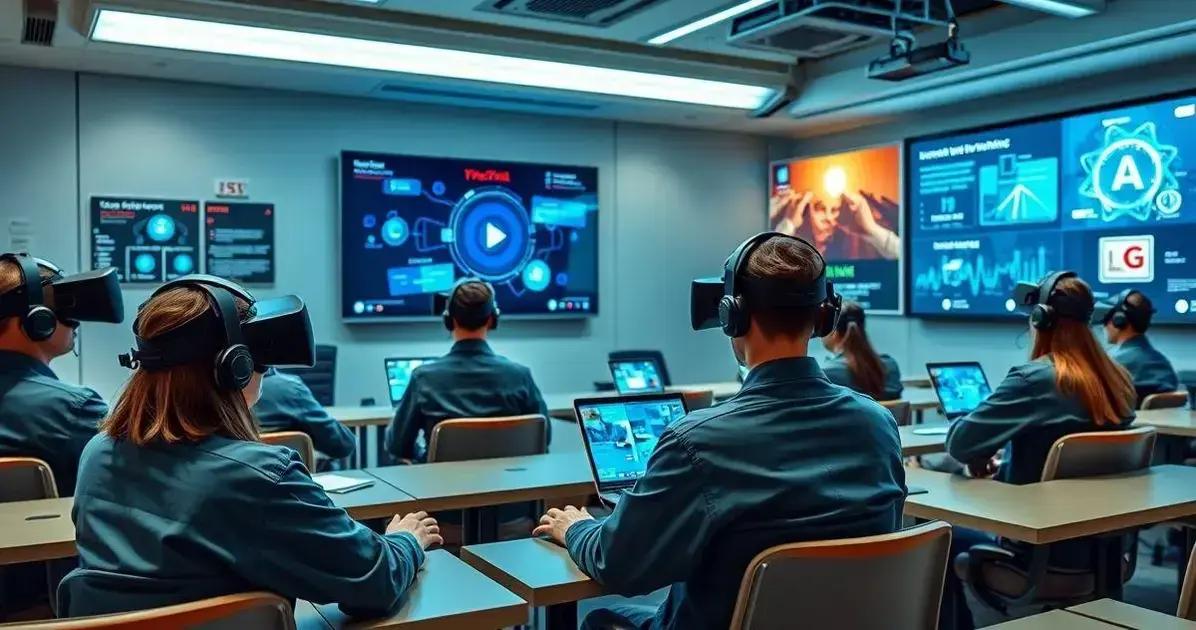Technical Training: Unlock New Skills and Propel Your Career Forward

Anúncios
Technical training is the gateway to mastering new skills and advancing your career. Whether you’re looking to boost your expertise in a specific field or explore new areas, technical training offers the foundation and advanced knowledge needed in today’s fast-paced world. From understanding the various types of programs available to taking advantage of cutting-edge training methods, dive into how to stay ahead with these crucial skills.
Understanding Technical Training
Technical training is a structured program or course designed to enhance your skills in a particular field, especially in relation to technology. These programs offer practical experience and theoretical knowledge needed to excel in various technical professions.
Key Features of Technical Training
Technical training emphasizes hands-on learning, allowing participants to work with tools and technologies they’ll encounter in their careers. This type of training often includes workshops, simulations, and real-world scenarios.
Target Audience: Designed for individuals seeking to enter technical fields or professionals looking to upgrade their skills, technical training is critical for those in IT, engineering, manufacturing, and many other domains.
Importance of Staying Updated
The rapid pace of technological advancement means that skills can quickly become outdated. Engaging in regular technical training ensures that you stay relevant and competitive within the job market.
Whether you’re a beginner or an experienced professional, understanding the fundamentals of technical training is crucial for career advancement and skill enhancement.
Benefits of Technical Training Programs

Benefits of technical training programs extend far beyond the classroom. They provide individuals with the essential skills needed to thrive in technology-driven industries. By participating in these programs, learners gain hands-on experience that is crucial for understanding complex technical concepts.
Enhanced Career Opportunities
Technical training opens doors to new job roles and career paths. Those equipped with updated skills are often preferred by employers, giving them a competitive edge.
Increased Efficiency and Productivity
Employees who undergo technical training can perform tasks more efficiently. This results in improved productivity and contributes positively to an organization’s success.
Staying Current: The tech industry evolves rapidly. Continuous technical training ensures you stay abreast of the latest advancements, techniques, and tools.
Personal and Professional Growth
Acquiring new skills boosts confidence and motivates individuals. Professional growth is accompanied by personal development, fostering a more fulfilled workforce.
Overall, the comprehensive nature of technical training programs caters to diverse industries, laying a solid foundation for future success and innovation.
Types of Technical Training Available
Types of technical training vary to suit different learning styles and industry needs. These programs range from short-term courses to comprehensive programs, designed to equip learners with specific skills.
Online Technical Courses
Online courses are popular due to their flexibility. They allow participants to learn at their own pace, accommodating schedules and varying levels of expertise.
Workshops and Bootcamps
Intensive workshops and bootcamps immerse learners in the subject matter. These formats focus on practical skills, often completed in a shorter time frame.
Certification Programs
Certification programs validate a learner’s expertise in particular technologies or methods. They are recognized by employers and can significantly enhance job prospects.
On-the-Job Training
Hands-on experience gained through on-the-job training enables workers to apply new skills immediately. This approach helps integrate learning with everyday tasks.
A variety of technical training types ensures that there is a suitable option for every learner, catering to different careers and learning preferences.
How to Choose the Right Technical Training

Selecting the right technical training is crucial for maximizing career growth. Start by identifying your career goals and the skills you need to achieve them. Research the available courses or programs that align with these goals.
Assessing Course Content
Examine the curriculum of each course. It should cover the skills you are aiming to learn and be relevant to current industry standards.
Instructor Expertise
Look for programs taught by experienced instructors. Instructors with industry experience can provide valuable insights and real-world applications.
Learning Format
Consider your learning preferences. Online courses offer flexibility, while in-person training provides direct interaction and networking opportunities.
Reviews and Recommendations
Read reviews from past participants. Their feedback can provide an honest perspective on the course quality and effectiveness.
Choosing the right technical training involves considering these factors to ensure you invest in a program that truly advances your skills and career.
Maximizing the Benefits of Technical Training
To truly maximize the benefits of technical training, it’s essential to apply what you learn. Practice skills regularly to reinforce knowledge and build competence.
Engagement and Participation
Actively participate in all training activities, from discussions to hands-on projects. Engagement deepens understanding and retention of new skills.
Setting Clear Objectives
Establish clear goals for what you aim to achieve through training. Having specific objectives helps measure progress and ensures focused learning.
Networking Opportunities
Connect with fellow participants and instructors for valuable insights and opportunities. Networking can lead to collaborations and sharing of best practices.
Continuous Learning
Technical training should be part of a commitment to ongoing education. Stay updated with new technologies and advances to keep your skills sharp.
Integrating these strategies into your training approach ensures you get the most from your educational investment, propelling your career forward.
Future Trends in Technical Training

Future trends in technical training are reshaping how skills are taught and acquired. The rise of virtual reality (VR) and augmented reality (AR) creates immersive learning experiences, allowing for more interactive and engaging sessions.
Artificial Intelligence in Training
AI is transforming technical training by personalizing learning experiences. Intelligent systems can adapt to individual learning speeds and identify areas for improvement.
Gamification
Incorporating game elements into training motivates participants and makes learning enjoyable. This approach enhances engagement, especially for younger audiences.
Blended Learning Approaches
Combining online and in-person training offers flexibility and depth. This hybrid model caters to diverse learning needs and schedules.
Adapting to these emerging trends is essential for learners and educators to unlock new skills and propel future careers forward effectively.
Embrace the Power of Technical Training
Technical training is a crucial investment for anyone looking to advance their skills and careers in the ever-evolving tech landscape. By understanding the types and benefits of various training programs, selecting the right course becomes a pivotal decision that can shape your professional journey.
Stay engaged and maximize these opportunities by actively participating in hands-on activities and setting clear learning objectives. As the industry evolves, embracing future trends such as AI and VR can further enhance your training experiences, making learning more interactive and effective.
Ultimately, unlocking new skills through technical training propels your career forward and prepares you to meet future challenges with confidence and competence.